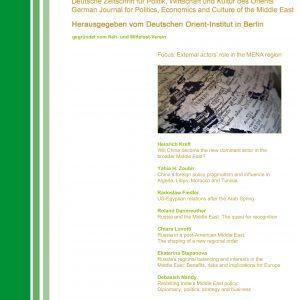Shop
Showing 177–192 of 350 resultsSorted by latest
-

Digital & Print
80,00 €incl. VAT
plus Shipping Costs
Add to basket -

Print
80,00 €incl. VAT
plus Shipping Costs
Add to basket -

Digital
80,00 €incl. VAT
Add to basket -

Revisiting India’s Middle East policy: Diplomacy, politics, strategy and business
7,90 €incl. VAT
Add to basket -

Russia’s regional balancing and interests in the Middle East: Benefits, risks and implications for Europe
7,90 €incl. VAT
Add to basket -

Russia in a post-American Middle East: The shaping of a new regional order
7,90 €incl. VAT
Add to basket -

Russia and the Middle East: The quest for recognition
7,90 €incl. VAT
Add to basket -

US-Egyptian relations after the Arab Spring
7,90 €incl. VAT
Add to basket -

China’s foreign policy pragmatism and influence in Algeria, Libya, Morocco and Tunisia
7,90 €incl. VAT
Add to basket -

Will China become the new dominant actor in the broader Middle East?
7,90 €incl. VAT
Add to basket -

Orient IV 2021
26,00 €incl. VAT
plus Shipping Costs
Select options This product has multiple variants. The options may be chosen on the product page -

Iran’s role in Gulf politics
7,90 €incl. VAT
Add to basket -

The blockade, Islamism and intra-sectarian tensions: Explaining Saudi-Qatari tensions
7,90 €incl. VAT
Add to basket -

Saudi Arabia’s new politics: Understanding rapprochement
7,90 €incl. VAT
Add to basket -

The perception of Iran in the foreign policy-making of the GCC monarchies
7,90 €incl. VAT
Add to basket -

Saudi Arabian regional policy
7,90 €incl. VAT
Add to basket





